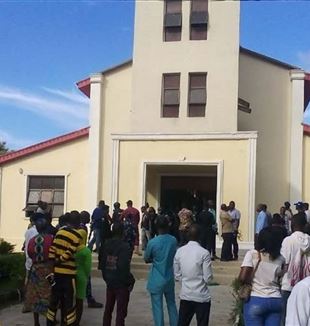
Nigeria: "The greatest help I receive”
After the attack in the church in Owo on June 5, the temptation was to say: “Nothing will ever change.” Barbara recounts what allowed her not to be discouraged, and what made her say “yes” again.The massacre on Sunday, June 5, during the Pentecost mass in Owo, caught us by surprise. Although terrorist attacks are very common in Nigeria, this massacre crossed a threshold that had not been crossed until now: it happened in southern Nigeria. Roland was the first to send a message about the massacre to our community whatsapp group. It was a shock to everyone. It was easy to say, "Nothing will ever change, there is no hope." Yet, the thought that "all is lost" did not prevail among us because there is something that embraces even that pain.
The thing I am perhaps most grateful for in the movement is that it has educated me to look at everything, even pain and the doubt that can arise from it. Our friendship teaches us to look at the things and people that exist. Sometimes bad things happen, but how often do good things happen and I take them for granted? Things are done and undone, as if everything is normal, but Jesus is at work within every single ordinary moment. I found myself looking at this attack by looking at Christ: the living Jesus who sustains me, who forgives me, who has come to be within me, just as has happened to the person in front of me, and those who died in the massacre.
Belonging to the movement, the path undertaken during these years with Fr. Carrón, have educated me to look with open eyes until I recognize Christ as the content of reality: mine first of all, and also that of others. I think of the protests of October 2020, when Lagos was on fire against the use of force by the police, or of this massacre in the church in Owo, but also of the little things in life that hurt or excite me. The movement has helped me to look deeply at the matter, to take every disturbance seriously and to let myself be challenged by what is in front of me, feeling the impact of reality. The heart then recognizes what is needed to live. In a simple way that is what I see happening here in so many people, who in very serious situations continue to go to Mass, remain Christians, risking their own lives and the lives of their loved ones.
Our friend Rose Busingye from Uganda came to visit us just a few days before the attack, and the situation was already very tense: the electoral campaign for next year's presidential election, terrorism in the North, the extreme poverty in which so many live... She was only here for three days but it felt like we had spent a month together because of the intensity of the moments we lived. The students, the conversations, the meetings with adults in the community. Struck by a question asked by one of us, Martins, "I understand that God is everything, so what should I do?", Rose understood that this was not "activism," but a simple, disarmed desire. She was able to grasp the purity of that question because it is her experience: the fullness of her relationship with Christ present, flesh of her flesh. You can see that she lives moved by it. You can perceive it in the morning when, even with her eyes still half closed, she tells you about Him who guarded her during the night, who continued to give her breath while she was in bed as if dead. It is a testimony to the fullness of life. Having a friend like that shapes my life, opens my eyes, makes me discover who I am, and every moment is the possibility of taking a small step forward.
Read also - Uganda: Moved by an experience that gives gusto to everything
If You, Christ, are everything and are "the life of my life," I can only thank You, that is, accept this undeserved love, which is given to me even as I forget it. Of the many dramas and wonders I see happening, I understand that I cannot do anything about the former and I cannot take possession of the latter, but I can say "yes" to this love, to this preference, to this Man who is flesh of my flesh. Over the years, some friends, such as Carrón, Rose and the friends with whom I live in the Memores Domini house, have been foundational to my life. If I find myself being patient with myself, embracing someone, not despairing about what happens or losing myself in analyses, it is because of the "yes" that my friends say: it is the greatest help I receive! So the only contribution I can make is to my own "yes."
Barbara, Lagos, Nigeria